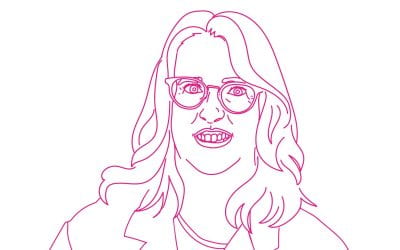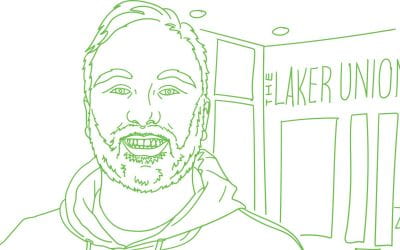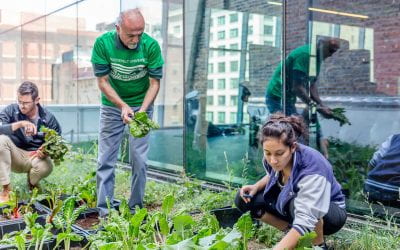Following his inner voice, opera singer’s journey leads to the Lyric and Met stages
Arts & CultureCarla Beecher
During the quiet moments in his life, Chicago College of Performing Arts alum Darell Haynes (MM ’11) has taken the time to listen deeply to what his mind, body and heart were telling him about the path forward. For the singer, whose powerful voice recently rang from the stages of the Lyric Opera of Chicago and the Metropolitan Opera, listening to his inner voice has made all the difference.
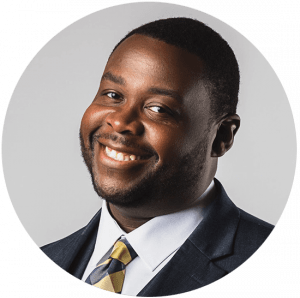 “I never thought this would be my reality,” he said while on tour. “The Metropolitan Opera is a pipe dream for a lot of people, and it was just the biggest shock and the biggest honor to sing on that stage. I’m so grateful for the opportunity.”
“I never thought this would be my reality,” he said while on tour. “The Metropolitan Opera is a pipe dream for a lot of people, and it was just the biggest shock and the biggest honor to sing on that stage. I’m so grateful for the opportunity.”
The gifted tenor was in town in late March for his Lyric debut as Nash in Grammy Award-winning trumpeter and composer Terrence Blanchard’s Fire Shut Up in My Bones. Also a member of the ensemble, Haynes was thrilled to perform on the very same stage where he saw his first professional opera just 13 years earlier while a graduate student at Roosevelt.
Based on Charles M. Blow’s bestselling book, the groundbreaking opera opened the Met’s season last September after an 18-month pandemic hiatus. It also marked the first time the venue staged an opera by a Black composer, librettist and an all-Black cast.
“At last, audience members who look like me have a chance to hear and see people who look like them singing on these stages. Representation matters,” said Haynes.
Performing at the Lyric
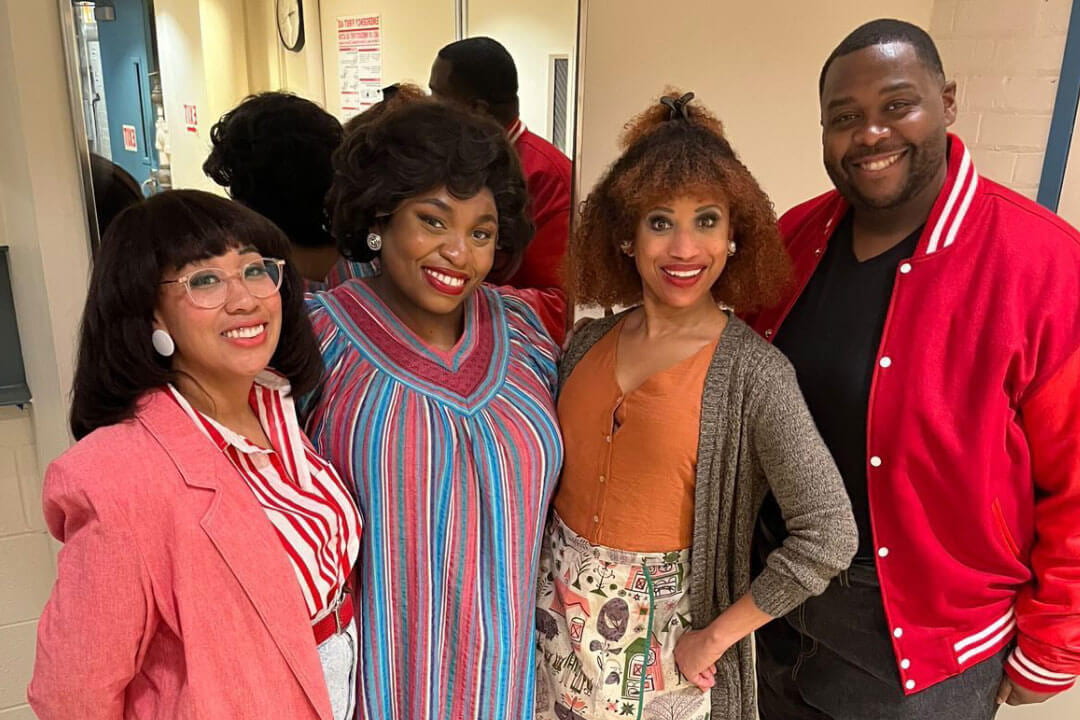
Other CCPA students, alumni and faculty appeared in the landmark Lyric production of Fire Shut Up in My Bones. From left:
- Amanda Neal (MM Voice, ’13), ensemble
- Veena Akama-Makia (Diploma Opera, ’22), ensemble/Bertha cover
- Kim Jones (Theatre Conservatory faculty), ensemble
- Darell Haynes (MM Voice ’11), Nash/ensemble
- Not pictured: Morgan Middleton (Diploma Opera, ’21), ensemble/Ruby cover
“At last, audience members who look like me have a chance to hear and see people who look like them singing on these stages. Representation matters.”
—Darell Haynes, MM ’11
Haynes’ unique journey to the Met and Lyric started by growing up the youngest of four siblings in Luling, Louisiana, a town on the outskirts of New Orleans. Haynes was first drawn to singing in church.
His parents, Brenda and Charlie Haynes Jr., both sang in the choir. “My father was a soloist, and I saw how the congregation reacted to him … respected him,” said Haynes. “I thought, ‘I want that. I want people to leave church happier because they heard me sing.’” The day after turning 10, he joined the junior choir.
Haynes continued to sing throughout school, performing in his first opera at Southeastern Louisiana University. But he wasn’t the star. “If I got a part, it was by the grace of God,” he said. “I never really was taken seriously as a singer then.”
In addition to singing, Haynes picked up the euphonium, a small brass horn similar to a tuba, when he was 12 and was hooked. He went on to earn a bachelor’s degree in 2006 and a master’s in 2009 in instrumental performance from SELU, with his sights set on a career as a professor at a small college.
Taking his own counsel
But about midway through his master’s degree, Haynes began to seriously consider what a life playing the euphonium would look like. He realized that what he really wanted was to pursue singing.
“On an instrument, everyone is expected to have a certain quality of sound without much variation or personal flair,” he explained. “But with the human voice, no one expects you to sound like someone else. You get to be an individual.”
Haynes kept quiet about his decision to pursue a second master’s degree in vocal performance. “I knew people would try to talk me out of it,” he said. He applied to Roosevelt and was accepted for fall 2009.
Arriving in Chicago, he was nervous about not having all the usual training other vocal majors had: the diction classes, the foreign language skills, etc. Even so, Professor David Holloway, head of the voice department at the time, agreed to work with him.
During his second year, Professor Richard Stilwell noticed something unusual about Haynes’ upper register. Then a baritone, Haynes was “covering” notes when he didn’t need to.
“Once we corrected that, I found my voice to be more open and free,” Haynes said. “It was here where my true passaggi” — natural breaks in the voice — “were discovered. I truly credit Richard’s observation as the catalyst to my vocal transition to tenor.”
After earning a master’s in vocal performance from Roosevelt in 2011, he auditioned for the next year before deciding to return to school to become a teacher. While enrolled at Northeastern Illinois University, he again decided to follow his heart — and his voice — and have surgery on his tongue.
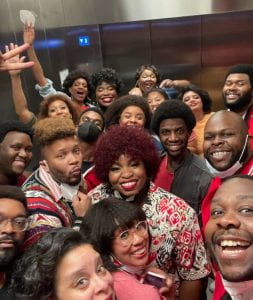
Roosevelt alumni, faculty and friends backstage at the Lyric Opera with Darell Haynes (right front corner).
Taking another chance
“I was what’s known as ‘tongue-tied,” he explained. “That little connector tissue under my tongue was too far forward in my mouth, and I couldn’t stick my tongue out all the way. I was having issues rolling my Rs and couldn’t articulate all the languages. The surgery changed, or rather, revealed my voice. It released tension and brought in a new color and vocal range.”
“It was the scariest thing I have ever experienced in my life,” he continued. “For 18 years — 12 as an adult — I had been a baritone; but, at age 30, I knew that if I ever was going to fully become a tenor, I had to take a chance.”
It took three years to fully transition to a true tenor. His tenor voice, which contains a lot of baritone qualities, is currently classified as a Jugendlicher Heldentenor (young, heroic tenor) based on the German Fach system that categorizes operatic voices by their range, weight and color. The power of his voice allows him to sing over heavy orchestras — think Cavaradossi in Puccini’s Tosca or the title role in Wagner’s Lohengrin.
“It was the scariest thing I have ever experienced in my life. I knew that if I ever was going to fully become a tenor, I had to take a chance.”
—Darell Haynes, MM ’11

In 2017, Haynes decided to give his new voice its best chance of success and moved to Berlin, where he worked on his German repertoire while performing on European stages. Still based in Berlin, he’s found himself back in the U.S. many times to perform. In addition to appearing in Fire at the Met, he also appeared in three other productions there this season. This summer, he’ll travel to the Des Moines Metro Opera house for their production of Porgy and Bess.
“It has taken me a very long time to figure out who I am vocally,” he said. “I did not go the traditional route, and I did not want to be a tenor. I did not. To me, it’s the most demanding voice type because we have to consistently sing much higher than our natural speaking voices.”
Haynes explained, “Tenors must have a lot of patience because the sound doesn’t develop as fast as other voice types. Many times, I thought something was wrong with me: others’ voices were much lighter and could float. Mine couldn’t, and I didn’t understand what was going on. Eventually I realized that all voices are just different, with their own strengths and weaknesses.”
A big part of his journey has been the good fortune to study under some influential teachers. Among those is Dr. Cheryl Frazes Hill, associate professor of music education and director of the Conservatory Chorus.
“Cheryl taught us proper vocal technique; without it, singers can totally damage their voice,” Haynes said. “She also taught us to really, really listen to what’s happening around us. She is an exceptional teacher and a great person.”
Frazes Hill explained that singers learn many technicalities related to their instruments. “But it is through ensemble work that they learn the great art of listening to become part of the larger work in which they are performing,” she said.
“Darell — always focused and disciplined — has approached his artistry in a methodical and dedicated way,” Frazes Hill continued. “I am always so excited to read about his accomplishments and see the great joy his singing brings him — and others.”
“This quintessentially American opera is bringing in Black audience members — people who have probably never been to an opera before in their lives because they never thought that Black people did this.”
—Darell Haynes, MM ’11
Believing in yourself
Passionate about his art, Haynes believes that if you want to learn how to make great art, you must believe in your abilities. “You may not become a solo artist, but you could perform in a symphony or opera chorus, or you could do recitals,” he said. “There are so many options to being a classical singer.”
Haynes shares some similarities with Blow and Blanchard, including growing up in Louisiana. “For the first time in my career, I got to sing in my own Louisiana vernacular!” he said.
Both Haynes and Blow also are members of the historically Black fraternity Kappa Alpha Psi Inc., which figures prominently in the opera.
For Haynes, there was a transcendent moment after one performance at the Met. When the curtain came down, three men who hold top positions in the fraternity introduced themselves to him backstage and asked to take a picture with him. “Never in my life did I think I would be in the presence of these people,” Haynes said, still incredulous.
According to Haynes, there has never been a show like Fire. The opera encompasses so many forms of American music — rock, gospel, jazz — that are rooted in Black culture, as is the step show, which is a huge aspect of the nine historically Black fraternities and sororities that make up the Divine Nine. “The opera literally combines all these American styles and adds them to classical music. It’s just cool,” he said.
Many people think operas are only for the elite and the rich. “It’s not; it’s for everybody to enjoy,” he continued. “And this quintessentially American opera is bringing in Black audience members — people who have probably never been to an opera before in their lives because they never thought that Black people did this.”
Darell added, “This opera has been a long time coming, and I’m so proud to be a part of it.”
More in this section
Science labs foster collaboration and creativity
When plans were being drawn up for the new Wabash Building, they made sure to include state-of-the art laboratories to house the university’s chemistry, biology, biochemistry, health sciences and physics labs
Mixing it up with the city
Living, learning, working and volunteering in the Wabash building gives Sullivan a unique perspective on this glass and steel vertical campus.
Building as teacher
Professor Michael Bryson, PhD, has sweeping views about sustainability from his 27 years at Roosevelt.

